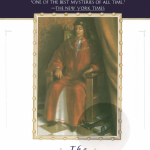I’m taking a brief break from the Peter Wimsey books to review Neil Gaiman’s latest, The Ocean at the End of the Lane: A Novel, which calls itself “A Novel” but which is most definitely a fairy tale. The book begins with this evocative passage:
It was only a duck pond, out at the back of the farm. It wasn’t very big.
Lettie Hempstock said it was an ocean, but I knew that was silly. She said they’d come here across the ocean from the old country.
Her mother said that Lettie didn’t remember properly, and it was a long time ago, and anyway, the old country had sunk.
Old Mrs. Hempstock, Lettie’s grandmother, said they were both wrong, and that the place that had sunk wasn’t the really old country. She said she could remember the really old country.
She said the really old country had blown up.
The book is a sort of memoir, a fairy tale cobbled together out of Gaiman’s childhood (or so I gather) and his own fertile imagination. A man returns to his childhood home for a funeral. He drives by his house, and on to the end of the lane. What was the name of the girl who had lived there? Hempstock. He remembers the “ocean”; and goes to take a look, and sits down, and remembers….
He remembers being a little boy. He remembers visiting the Hempstock Farm, and going for a walk with young Lettie Hempstock across the fields of the farm, far from the fields we know. And he remembers what he brought back home with him, and what happened after. This is a fairy tale; and Faerie is called the Perilous Realm for a reason. And sometimes the Perilous Realm comes and lives with you.
I have mixed feelings about The Ocean at the End of the Lane. It kept me reading, no question; Gaiman is an excellent storyteller. In tone, it reminded me of harder-edged, more adult Diana Wynne Jones: rather like Stopping for a Spell, only not played for laughs. There’s a bittersweet ending, and the sense that although the story is complete, the life is not. That’s not a bad thing, but I found the climax unsatisfying.












